Update on the Information and Communication Technologies Development Fund
On Friday (9 May), the Standing Committee on Administration and Management (ADM) reviewed a status report of the projects supported by the Information and Communication Technologies Development Fund (ICT-DF), including information on closed and on-going projects, contributions from external partners to the projects, projects supported during the development cycle for the period 2011-2014, as well as information on the ICT-DF Capital Account, which is evolving.
Presenting the status report (Document C14/10), Eun-Ju Kim, Chief of the Innovation and Partnership Department in ITU's Telecommunication Development Bureau (BDT), explained that according to Resolution 11 (Rev. PP-10), once all the expenditures have been recovered, a significant part of any generated positive revenues over expenses derived from ITU TELECOM activities is transferred to the ICT Development Fund (ICT-DF) under BDT for specific telecommunication /ICTdevelopment projects, primarily in the least developed countries, small island developing States, landlocked developing countries and countries with economies in transition.
Strategic decisions pertaining to the approval of projects and the allocation of funds to these projects are taken by a Steering Committee made up of the Secretary-General, the Deputy Secretary-General and the Director of BDT.
Discussions then focused on the importance of the ICT-DF in providing seed money to attract partnerships and funds for implementing a wide range of development projects, inter alia, the Regional Initiatives in line with WTDC Resolution 17.
Councillors approved the Secretary-General's recommendation in the report to transfer USD 2 million from the Exhibition Working Capital Fund to ICT-DF Capital Account to support national, regional and global projects, while innovative approaches for financial and human resource mobilization and partnership building are strengthened.
Some councillors requested more details on projects financed through the ICT-DF Capital Account and on the methodology used by the ICT-DF Steering Committee to estimate amounts recommended for transfer from the Exhibition Working Capital Fund to ICT-DF.
Next step
In response to these requests, a future report from the Secretary-General will provide more detailed information on the projects supported by the ICT-DF and on the methodology used to determine the amounts needed to ensure adequate or proper support to members requesting assistance for development projects at national, regional and global levels, inter alia, those relating to the Regional Initiatives approved at the recent World Telecommunication Development Conference (WTDC-14).
Strategic and Financial Plans for the Union for 2016-2019
Discussions got under way on Friday in the ADM Committee to start examining the report of the Council Working Group on the Strategic Plan and Financial Plan for 2016-2019 (as reported in Issue No. 2 of Council 2014 Highlights on 7 May). Mario Canazza, the group's Chairman presented its report summarizing the results of its four meetings, held between June 2013 and May 2014:
-
First meeting: overall structure of the draft Strategic Plan.
-
Second meeting: glossary and structure of the Strategic Plan, ITU strategic framework, structure of the Financial Plan and maintaining the contributory unit level at CHF 318,000.
-
Third meeting: presentation of proposed strategic framework and inclusion of annexes to Resolution 71.
-
Fourth meeting: proposed revisions to Resolutions 71 (Strategic Plan), 72 (Linking strategic, financial and operational planning in ITU), and 151 (Implementation of results-based management in ITU).
A number of councillors expressed appreciation for the report, citing in particular the linkage it establishes between strategic, financial and operational planning in ITU. The zero nominal growth in the amount of the contributory unit that is maintained at CHF 318,000 in the draft Financial Plan for 2016-2019 was welcomed by all councillors.
The Committee discussed and agreed on the proposed three annexes to Resolution 71:
-
Annex 1: Background on the Strategic Plan for the Union for 2016-2019 (Addendum 3 to Document 43 Rev. 1, including Corrigendum 1).
-
Annex 2: Strategic Plan for the Union for 2016-2019 (Addendum 4 to Document 43 Rev. 1, including a proposal from the United States on outcomes and outputs of the new inter-Sectoral objective I.5: "Enhance access to telecommunications/ICTs for persons with disabilities and specific needs ).
-
Annex 3: Glossary of the Strategic Plan for the Union for 2016-2019 (Addendum 5 to Document 43 Rev.1).
The Russian Federation proposed to include the Financial Plan as Annex 4 to Resolution 71, sparking several comments from other Council Member States. The Committee agreed to invite the Chairman of the Council Working Group on Financial and Human Resources to coordinate the Russian Federation's proposal and come up with a commonly agreed text to be included in Resolution 71, with the aim of ensuring the proposed proper linkage between the strategic and financial plans. Draft Resolutions 72 and 151 were discussed and endorsed by the Committee.
Next step
A group of councillors will meet and submit further revisions to Resolution 71 (Strategic Plan) with a view to reflecting some reference to the linkage between the strategic and financial plans. Meanwhile, the ADM Committee recommends that the plenary review the proposed draft Strategic and Financial Plans of the Union for 2016-2019, along with the proposed draft Resolutions 71, 72 and 151, and make any changes it deems necessary for submission to the Plenipotentiary Conference (PP-14).
Report by the Chairman of the Council Working Group on Financial and Human Resources (CWG-FHR)
Dr Bruce Gracie (Canada), Chairman of the Council Working Group on Financial and Human Resources, presented the group's report (Document C14/45). It contains a summary of the group's deliberations on 24 and 25 February 2014, along with proposed actions on the following issues:
-
Potential Sector Membership reforms
-
Review of document access policy in ITU
-
Impact on revenues arising from free online access
-
Revision of the terms of reference of CWG-FHR regarding the follow-up to the recommendations of the Independent Management Advisory Committee (IMAC)
-
Financial and strategic implications of Memoranda of Understanding (and Memoranda of Cooperation and Agreement) to which ITU is or will be a party
-
Consideration of the elaboration of the draft Financial Plan and modifications to Decision 5 (Revenue and expenses of the Union for the period 2016-2019)
-
Review of the implementation of the Human Resources Strategic Plan and Resolutions 48 (Rev. Guadalajara, 2010), Human resources management and development.
Several countries commended CWG-FHR and expressed appreciation for its exhaustive and comprehensive report.
Access to ITU documents – the secretariat weighs in
The issue of access to ITU documents and public disclosure of reports of the Internal Auditor, External Auditor and IMAC was the subject of lengthy and intense debate, and generated many interventions from councillors.
The secretariat also weighed in with its presentation on access to ITU documents. For a bit of background, Council 2013 decided to amend the terms of reference of its Council Working Group on Financial and Human Resources and requested it to review ITU's document access policy in order to determine the extent to which documentation should be made publicly accessible (Decision 563). During Council 2012, Mr Gracie had led informal discussions with 25 councillors to exchange views and ideas on the issues relating to ITU's document access policy.
To facilitate the discussion of the Council Working Group on Financial and Human Resources, Mr Gracie had requested the secretariat to prepare a background document for the group's February 2014 meeting. In preparing this document (Document C14/INF/20 E), the secretariat considered it important, as a first step, to clarify the matter.
Although words such as "document", "publication", and "information" might appear interchangeable, each one of them has a clear, distinct meaning. In order to avoid any confusion and misunderstanding, the secretariat's document provides a definition of each term and highlights three essential points:
-
Information is the most generic concept, and it can be captured in a database, a document, a publication, sound record, e-mail, picture and so on.
-
A document and a publication are not the same. Documents are created as a working tool for internal use, while a publication is always produced for distribution to the public. All ITU publications are for distribution to the public.
-
Finally, the issue is NOT whether the information is accessible for free or not. The issue is whether the information is available to the public or not.
The secretariat's document goes on to present a review of policies and practices in the United Nations and other UN specialized agencies. Based on the results of the informal discussion that took place in 2012, the secretariat undertook a survey of 14 UN Agencies, Funds and Programmes. Preliminary research was conducted via the Internet. Results were communicated to the agencies through the UN Governing Bodies Secretariat Group. A number of agencies have validated the information.
The document then presents an overview of ITU policy and practices in the Sectors and the General Secretariat. It has been written in close consultation with all three Sectors and the Departments of the General Secretariat. It presents a picture of the current situation and provides a historical perspective of some elements. Finally, it highlights the issues to be considered with respect to an information access policy for ITU.
The United States presented its Document 64 on working methods for the upcoming Plenipotentiary Conference (PP-14) and proposed that the Council decide to make publicly available without password protection all documents for PP-14. Recalling that during the preparations for the World Conference on International Telecommunications in 2012 (WCIT-12), it had been agreed to open the contributions of Member States to the public, the United States stressed that it was time ITU moved in the direction of openness.
Two other documents from the United States were presented, namely: Document C14/61 on public disclosure of reports of the Internal Auditor and the Independent Management Advisory Committee and Document C14/62 on Public disclosure of reports of the External Auditors.
General discussion
Several countries expressed their support to general disclosure of ITU documents, including the IMAC report, the External Auditors as well as the internal audit report in order to improve transparency and enhance visibility of the Union (Japan, Greece, Czech Republic, Mexico and Sweden). They also supported the development of a policy on public access to documents.
Several other countries called for caution, arguing that without sufficiently examining and verifying information may lead to incorrect conclusion and may affect the image of ITU or have financial consequences. In the case of conferences (for example during a WRC), disclosing documents at a preliminary stage could have a negative impact. They proposed not to present any recommendations on this issue in the course of the current Council session, saying that the matter should be discussed at PP-14 (this was the view of the United Arab Emirates and the Russian Federation). Clarification was further requested from the secretariat as to whether the Council was mandated to take such decision on access to documents. It was clear that the decision taken regarding the document for WCIT-12 was an exception and should not set a precedent.
Kenya, while appreciative of the desire for further transparency, considered that it was premature to decide that the IMAC report and the audit reports be made public. This view was supported by Senegal and Burkina Faso.
Mr Gracie stated that Document C14/INF/20 clearly demonstrated that a decision on access to documents needed to be taken carefully, and that all factors should be taken into consideration. He also stressed that a clear distinction should be made between the annual audit report and the individual audit reports.
The ITU Legal Adviser explained that Council 2012 had considered itself competent to make Document DT 64, representing a compilation of contributions from Member States, open to the public. However, it was WCIT-12 itself that decided to make the outcome of the conference available to the public.
Bahrain, as an observer Member State, called for further analysis on the issue in order for PP-14 to take a decision.
As a conclusion, the Chairman of the ADM Committee suggested that the overall access to information/document policy was an issue for the Plenipotentiary Conference and suggested that the secretariat be encouraged to further study the issue in order to facilitate the discussions during PP-14. This was accepted.
The Chairman further suggested that regarding specific requests such as the IMAC, external auditor, and internal auditor reports:
-
the IMAC report and the external auditor reports could be published as soon as the Council approved them;
-
the summary of the annual report of the internal auditor could be published after approval of the Council.
The conclusions from the Chairman raised comments as to whether the Council should approve the IMAC report or note the IMAC report before it is made available to the public (Mexico, Brazil).
Several countries stressed again the need to discuss this issue at PP-14 (United Arab Emirates, Cuba, Russian Federation).
ITU Deputy Secretary-General proposed that the ADM Committee recommends to the plenary to make publicly available after approval of the Council, the IMAC and External Auditor's report, and the summary of the annual report of the Internal Auditor, on a temporary and exceptional basis until PP-14 decides on the general policy on access to ITU documents and public disclosure. Such temporary arrangement should in no way create any precedence for future action in this regard until PP-14 decides on the matter, as appropriate. This proposal was accepted.
Next steps relating to the CWG-FHR report
The ADM Committee recommends that the plenary note the work of CWG-FHR; consider the proposals to revise Decision 5 (Rev. Guadalajara, 2010), and Resolutions 152 (Rev. Guadalajara, 2010), 158 (Rev. Guadalajara, 2010), 169 (Guadalajara, 2010) and 170 (Guadalajara, 2010), and a new draft Resolution on the review of the current methodologies for the participation of Sector Members, Associates and Academia in the activities of ITU and forward them to the Plenipotentiary Conference for consideration; and approve the proposed amendments to Decision 563 (modified 2013) and Decision 535 (modified 2011).
MoUs having financial and/or strategic implications
The secretariat presented an information document (Document C14/INF/13) that lists Memoranda of Understanding (MoU) signed by ITU since the last Plenipotentiary Conference (PP-10). It provides accurate and exhaustive information on the number and type of MoUs that have financial and/or strategic implications for the Union, in particular in the area of cybersecurity.
Agreements that are not listed in the document include: specific agreements relating to technical cooperation, voluntary contributions, repayment, GMPCS (global mobile personal communication systems) and host country; agreements for the organization of workshops and seminars, and on the distribution of publications, as well as project documents.
One councillor queried why three of the MoUs listed in the document were signed by the Secretary-General while one was signed by the Director of a Bureau. The secretariat clarified that the Secretary-General had delegated the signature to the Director since the activity concerned solely that specific Bureau.
The ADM Committee recommends that the plenary note the document.
Contribution from Brazil: Measures for reducing expenditure
Brazil presented its Document C14/69 featuring ten proposals, matched with twenty-one measures for reducing expenditure. These measures and proposals pertain to the following:
-
Appraisal of staff requirements, organizational changes and staff redeployment
-
Reduction in the costs of documentation and implementation of paperless office concept
-
Reduction in the volume of documentation workload
-
Efficient procurement system
-
External hosting of ICT commodity services
-
Travel costs management improvement
-
Coordination and harmonization of seminars and workshops
-
Coordination with regional organizations
-
Limitation of number of meetings for advisory groups
-
WSIS activities funding through voluntary contributions
-
Remote participation
-
Unified communication
-
Improved working methods in ITU's Information Services Department
-
Proposal Management system.
Malcolm Johnson, Director of ITU's Telecommunication Standardization Bureau (TSB) informed the ADM Committee that some of the efficiency measures had already been applied in TSB, for example: advance bookings, travel by economy class and outsourcing of translation work. A number of councillors expressed appreciation for the savings generated, others stressed that the quality of translation should not be compromised.
Next step
The ADM Committee recommends that the plenary discuss Brazil's proposals and recommend to the Plenipotentiary Conference to amend Decision 5 accordingly.
|
Quick Links
Photos and videos
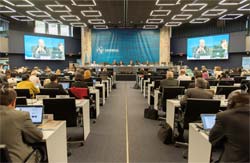
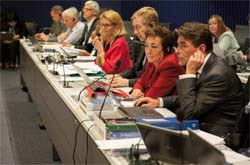
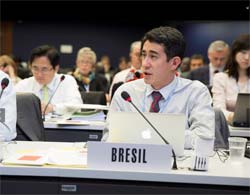


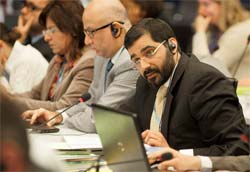
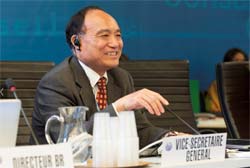
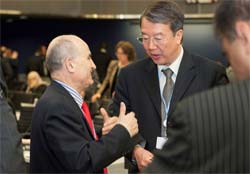
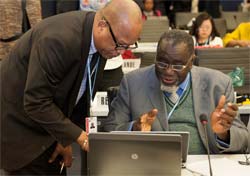
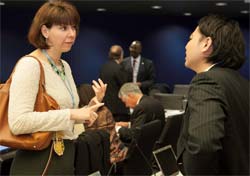
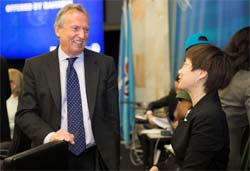
|
